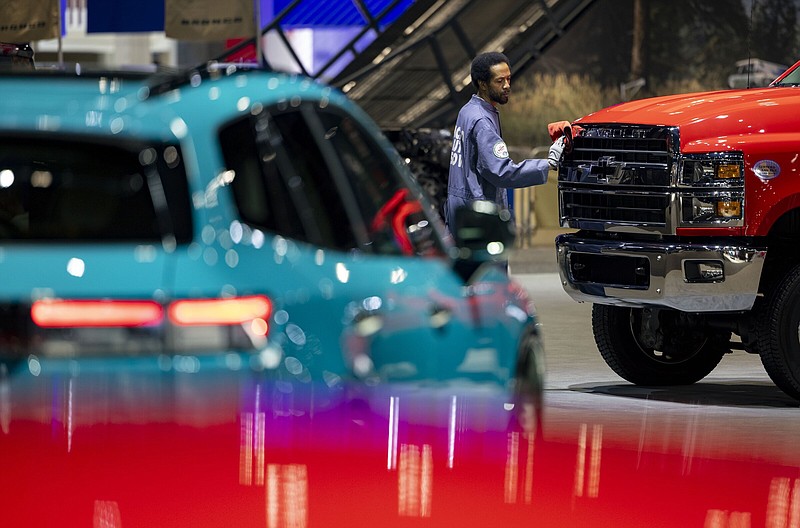The annual Chicago Auto Show opens today at McCormick Place, and for the first time in nearly a century, one of the Big Three automakers will not be there.
Tightening its belt in the wake of the protracted United Auto Workers strike last fall, Stellantis decided to skip the auto show entirely, pulling its Jeep, Chrysler, Dodge, Fiat and Ram vehicles off the floor and ending the two-decade run of the popular Camp Jeep test track.
The auto show has consolidated exhibits down from two halls into one, but packed the space with an expansive lineup of brands, plenty of interactive exhibits and a robust lineup of electric vehicles, including show newcomers Tesla and Lucid.
Chicagoans will have their first chance to kick the giant tires of the long-delayed Tesla Cybertruck, a futuristic-looking electric vehicle that began rolling off the production line last fall. They can also get their first look at the digitally refreshed 2025 Ford Explorer, which is made in Chicago.
Homegrown Rivian, which makes electric trucks and SUVs in downstate Normal, won't be at this year's auto show.
Electric vehicles will be center stage once again this year, with a dedicated electric-vehicle test track and a slew of new offerings. But there may be a few bumps in the road ahead for electric-vehicle manufacturers, who are facing slowing demand and their own potential labor strife.
Edmunds is projecting 15.7 million new cars to be sold in 2024, up from 15.5 million last year. Electric-vehicle market share is expected to reach 8% of total new vehicle sales in 2024, up from 6.9% last year, according to the car shopping website.
Electric vehicles topped the 1 million sales mark in the U.S. last year for the first time.
But there are signs, despite federal, state and manufacturer incentives, that adoption of electric cars has decelerated as consumers grapple with spotty charging infrastructure, range anxiety and other logistical hurdles to taking the plunge.
VW America Chief Executive Officer Pablo Di Si, an Argentine who attended Loyola University in Chicago during the 1990s, returned to town for the auto show, touting the brand's ambitious strategy to offer a lineup of 25 electric vehicles planned by 2030.
Electric-vehicle models on display included the ID.4, which is produced at VW's plant in Chattanooga, Tenn., and sold 75,000 units in North America last year. A quirkier entry is the VW.Buzz, a retro electrified version of the VW van that was favored during the 1960s.
The VW.Buzz is expected to hit the roads later this year.
Di Si expects initial demand for the VW.Buzz to outstrip supply. And he said if they could have built more ID.4s last year, they would have sold them. Longer term, as manufacturers increase the number of offerings, electric-vehicle market share will continue to grow, but how quickly that ramps up remains to be seen, Di Si said.
"In the last couple of years, the growth of EVs has been pretty dramatic," Di Si said. "This year, the growth continues, but not as intensive as the last couple years. Time will tell."
While adoption of electrics remains a variable, VW and other nonunion manufacturers may also face some labor issues in the coming year.
In the aftermath of the six-week strike against Detroit automakers, UAW President Shawn Fain said the union intends to target nonunion plants, including electric-vehicle manufacturers, to get them to join. Organizing efforts are underway at Toyota, Honda, Hyundai, Tesla, Nissan, BMW, Mercedes-Benz, Subaru, Volkswagen, Mazda, Rivian, Lucid and Volvo plants in the U.S.
Di Si was tapped to head up VW's North American operations in 2022, and moved to Chattanooga, site of the German automaker's only U.S. plant. More than 4,000 nonunion autoworkers build the all-electric ID.4 there, as well as the combustion-engine Atlas SUV.
On Tuesday, the UAW announced a majority of workers at the plant had signed cards to join the union, making it the first of the recently targeted nonunion plants to support the organizing effort.
"Obviously, we respect the right of freedom," Di Si said. "We also emphasize providing correct information to the employees so they can make their own informed decisions."
With the 25% increase in base wages and the reinstatement of cost-of-living adjustments, UAW assembly workers will make more than $40 an hour by the end of the new four-year labor agreement in 2028.
Assembly workers at the VW plant start at $23.40 per hour, scaling up over four years to $32 per hour, Di Si said.
The UAW is also seeking to unionize Rivian, which started production in September 2021 and now has about 7,000 employees building electric pickups, SUVs and delivery vans for Amazon and AT&T in a formerly vacant, 3.3 million-square-foot auto plant in downstate Normal.
Last year, Rivian produced 57,232 vehicles.
In 2022, the starting salary for assembly workers at Rivian's plant in Normal was $20 per hour. The starting rate has since been bumped up to $22 per hour, according to spokeswoman Kelli Felker.
After three years of pandemic disruption that saw postponements, downsizing and a special outdoor summer edition, the Chicago Auto Show returned last year to a full-size exhibition covering two halls at McCormick Place.
Inaugurated in 1901, the Chicago Auto Show went on hiatus during World War II as auto production was curtailed, but it hasn't missed a year since it resumed in 1950. The 116th Auto Show runs today through Feb. 19. Tickets are $17 for adults.
